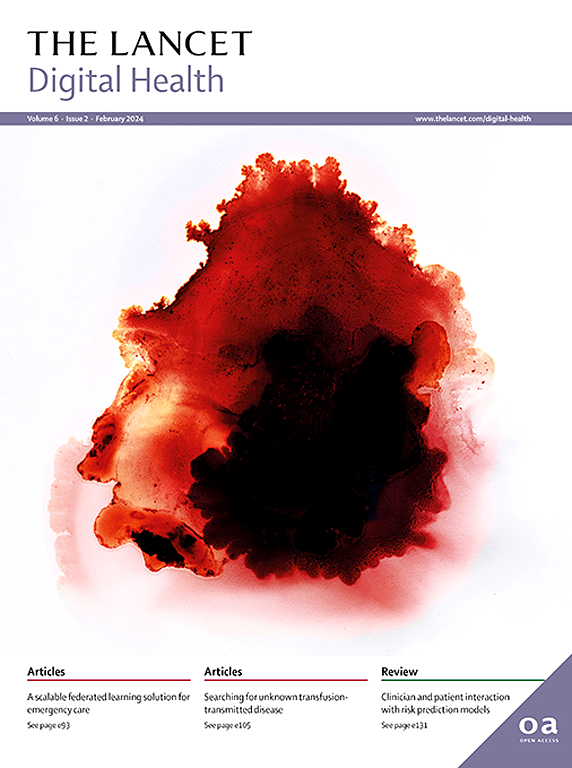Attitudes and perceptions of medical researchers towards the use of artificial intelligence chatbots in the scientific process: an international cross-sectional survey
IF 24.1
1区 医学
Q1 MEDICAL INFORMATICS
引用次数: 0
Abstract
Chatbots are artificial intelligence (AI) programs designed to simulate conversations with humans that present opportunities and challenges in scientific research. Despite growing clarity from publishing organisations on the use of AI chatbots, researchers' perceptions remain less understood. In this international cross-sectional survey, we aimed to assess researchers' attitudes, familiarity, perceived benefits, and limitations related to AI chatbots. Our online survey was open from July 9 to Aug 11, 2023, with 61 560 corresponding authors identified from 122 323 articles indexed in PubMed. 2452 (4·0%) provided responses and 2165 (94·5%) of 2292 who met eligibility criteria completed the survey. 1161 (54·0%) of 2149 respondents were male and 959 (44·6%) were female. 1294 (60·5%) of 2138 respondents were familiar with AI chatbots, and 945 (44·5%) of 2125 had previously used AI chatbots in research. Only 244 (11·4%) of 2137 reported institutional training on AI tools, and 211 (9·9%) of 2131 noted institutional policies on AI chatbot use. Despite mixed opinions on the benefits, 1428 (69·7%) of 2048 expressed interest in further training. Although many valued AI chatbots for reducing administrative workload (1299 [66·9%] of 1941), there was insufficient understanding of the decision making process (1484 [77·2%] of 1923). Overall, this study highlights substantial interest in AI chatbots among researchers, but also points to the need for more formal training and clarity on their use.
医学研究人员对在科研过程中使用人工智能聊天机器人的态度和看法:一项国际横断面调查。
聊天机器人是一种人工智能(AI)程序,旨在模拟与人类的对话,为科学研究带来了机遇和挑战。尽管出版机构对人工智能聊天机器人的使用越来越明确,但对研究人员的看法仍不甚了解。在这项国际横断面调查中,我们旨在评估研究人员对人工智能聊天机器人的态度、熟悉程度、感知到的益处和局限性。我们的在线调查于 2023 年 7 月 9 日至 8 月 11 日开放,从 PubMed 索引的 122 323 篇文章中确定了 61 560 位通讯作者。有 2452 人(4-0%)提供了回复,符合资格标准的 2292 人中有 2165 人(94-5%)完成了调查。2149名受访者中有1161人(54-0%)为男性,959人(44-6%)为女性。2138名受访者中有1294人(60-5%)熟悉人工智能聊天机器人,2125名受访者中有945人(44-5%)曾在研究中使用过人工智能聊天机器人。2137位受访者中只有244位(11-4%)报告了机构对人工智能工具的培训,2131位受访者中有211位(9-9%)指出了机构对人工智能聊天机器人使用的政策。尽管对人工智能聊天机器人的益处看法不一,但 2048 人中有 1428 人(69-7%)表示有兴趣接受进一步培训。尽管许多人重视人工智能聊天机器人减少行政工作量的作用(1941 人中有 1299 人[66-9%]),但对决策过程的了解却不够(1923 人中有 1484 人[77-2%])。总之,本研究强调了研究人员对人工智能聊天机器人的浓厚兴趣,但也指出需要对其使用进行更正式的培训和说明。
本文章由计算机程序翻译,如有差异,请以英文原文为准。
求助全文
约1分钟内获得全文
求助全文
来源期刊

Lancet Digital Health
Multiple-
CiteScore
41.20
自引率
1.60%
发文量
232
审稿时长
13 weeks
期刊介绍:
The Lancet Digital Health publishes important, innovative, and practice-changing research on any topic connected with digital technology in clinical medicine, public health, and global health.
The journal’s open access content crosses subject boundaries, building bridges between health professionals and researchers.By bringing together the most important advances in this multidisciplinary field,The Lancet Digital Health is the most prominent publishing venue in digital health.
We publish a range of content types including Articles,Review, Comment, and Correspondence, contributing to promoting digital technologies in health practice worldwide.
 求助内容:
求助内容: 应助结果提醒方式:
应助结果提醒方式:


